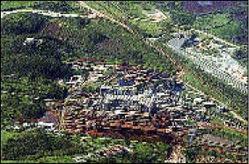Howard Campbell, Staff Reporter

Aerial shots of the Alpart Kirkvine bauxite plant in Manchester photographed on September 15, 2004. - Andrew Smith /Photography Editor
LONG BEFORE Dalton Brown was elected councillor for Manchester's Alligator Pond division, he was aware of the challenges persons living on resettled bauxite lands in the parish faced.
Currently in his second term with the Manchester Parish Council, Brown and his colleagues are determined to improve the resettlement process and regularise these communities.
"The most important thing for us right now is to hand over titles to owners, so we can divide some of these lands, getting better roads and a proper water supply," Brown said.
Part of that problem was solved in June when Alumina Partners (Alpart) committed J$70 million to fixing roads in resettlement communities like Emporium, located in south Manchester.
The Emporium 'resettlement' is in the Alligator Pond division, and is built on lands once mined by Alpart. It is one of the oldest resettlement sites in Manchester.
Gerald Wellington relocated to Emporium 22 years ago from Warminster in St Elizabeth. For him, improved roads is good news, but he believes more needs to be done for his community to be considered self-sustained.
Main problem
"We have never had water; that is the main problem," said the 49-year-old postal worker.
Many of Dalton Brown's constituents in Emporium and Montpelier occupy lands once mined by Alpart. He said most are small farmers and low-income earners who moved on to former bauxite lands without recognising the shortfalls.
In addition to bad roads and a non-existent water supply, electricity was also a problem. It was not until the 1990s that these areas were properly supplied by the Jamaica Public Service.
Brown admitted, however, that newer resettlement schemes in Manchester, such as Montpelier (Phase 3), Newark and Spur Tree have little headaches.
Winston Palmer is secretary general at the Manchester Parish Council. He says regulating resettlements is one of the priorities for his office. Like Brown, he is concerned with the number of settlers not holding titles for their land.
"Because of this, whenever something happens in these sub-divisions, the parish council is blamed," Palmer told The Gleaner.
Despite the long-standing issues, Palmer says commerce in Manchester has benefited from resettlement of mined-out bauxite lands.
"The spin-offs are significant. It increases sales of hardware products, so that sector has thrived and workmen are in demand," Palmer explained.
"Importantly, resettlement retains people in Manchester."
While many persons in St Ann have used resettled land for agricultural purposes, the Jamaica Bauxite Institute (JBI) reports that more than 230 acres of former bauxite land has been used for housing in Manchester.
The JBI and commissioner of mines are part of a land-reclamation committee which oversees plans for mined-out lands. The JBI has aggressively promoted housing development in Manchester.
Three years ago, it acted as facilitator in the National Housing Trust's purchase of mined-out property in the town of Perth, while another major expansion took place in Moorlands, another town in the parish's southern region.
There are still concerns that many hectares of mined-out land in south Manchester available for divestment by Alpart remain unallocated and unused. The JBI reports that 25 per cent of all mined-out lands remains unused and this is a sore point for the Government.
In 2005, the administration of Prime Minister P.J. Patterson amended the mining regulations to allow a penalty of US$25,000 per hectare to be applied if any bauxite company disturbed an area for mining without bringing it to certification within two years.
Bauxite companies with a backlog of reclaimed lands are required to submit their plans for dealing with this pile-up to the commissioner of mines for review and approval.

